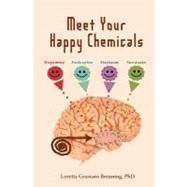Meet Your Happy Chemicals : Dopamine, Endorphin, Oxytocin, Serotonin
, by Breuning, Loretta Graziano, Ph.d.- ISBN: 9781463790929 | 1463790929
- Cover: Paperback
- Copyright: 2/14/2012
Humans have emotional ups and downs because we've inherited the operating system of earlier mammals. You feel good when you find new rewards because that triggers dopamine. You feel good when you get respect because it triggers serotonin. Building trust triggers oxytocin, and endorphin makes you feel good when you're injured. The mammal brain releases happy chemicals when you do things that promote survival in the state of nature. You can get more happy chemicals from your brain when you understand the job it evolved to do.Happy chemicals were not meant to surge all the time. They evolved to reward you when you promote the survival of your genes. You define this in unique individuals ways because early experience builds the neural pathways that turn on the happy chemicals. But beneath your uniqueness you have a mammalian core that cares as much about your legacy as it does about your body."I don't see happiness this way," you may say. That's because neurochemicals work without words. They turn on and off without reporting the reason to your cortex. Your limbic system and your cortex are literally not on speaking terms. But in other people, you can easily see these mammalian motives. And research on animals reveals uncanny parallels. The same basic happy chemicals motivate animals to promote survival with the same basic behaviors. The mammalian operating system is simple. Happy chemicals tell you what to go toward, and unhappy chemicals tell you what to pull away from. Unhappiness is part of life because unhappy chemicals alert you to survival threats. Being left out of the group threatens survival in the state of nature. So does losing out on mating opportunities. When an animal smells a predator, the bad feeling of cortisol motivates it to stop grazing and run. Bad feelings exist because they promote survival. When you are passed over for a promotion, you know it's not a predator attack. But if feels that way because you've inherited the neurochemicals that have successfully promoted survival for millions of years.This book shows how to re-wire yourself for more happy chemicals. It explores the vicious cycle you might create when your happy chemicals dip. You don't like the unhappy chemicals that get your attention when a happy chemical surge is over. You may rush to stimulate more happy chemicals in ways that ultimately bring unhappiness. Such happy habits get repeated despite the consequences because electricity in your brain flows down the biggest channels. You can build new neural highways to support new happy habits. It's not easy to build re-build your neural infrastructure in adulthood. This book shows you how.






